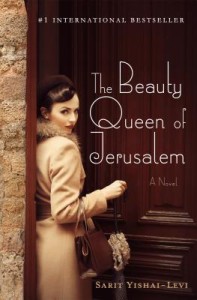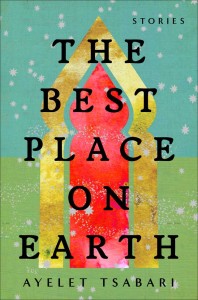
by admin
A New Trend in Israeli Fiction: Diversity
Two books — one a novel, another a collection of short stories––underscore a new trend in Israeli writing, which seeks to give a voice to Sephardim and Mizrahim, ethnic groups often underestimated or whitewashed in Israeli history, culture and society.
 In The Beauty Queen of Jerusalem, (St. Martin’s Press, $25.99) her best-selling and award-winning family saga about the Ermosa family, Israeli journalist Sarit Yishai-Levi sheds a welcome light on the Sephardi community established in Jerusalem (via Salonika, then part of the Turkish Empire), shortly after the expulsion of the Jews from Spain in 1492, well before the advent of 19th-century political Zionism.
In The Beauty Queen of Jerusalem, (St. Martin’s Press, $25.99) her best-selling and award-winning family saga about the Ermosa family, Israeli journalist Sarit Yishai-Levi sheds a welcome light on the Sephardi community established in Jerusalem (via Salonika, then part of the Turkish Empire), shortly after the expulsion of the Jews from Spain in 1492, well before the advent of 19th-century political Zionism.
This historical novel chronicles four generations of Ermosa women from 1920s Turkish Palestine to 1980s Israel: Mercada, her daughter-in-law Rosa, Rosa’s three daughters, Rachelika, Becky and Luna—the “beauty queen of Jerusalem”—and, finally, Luna’s daughter Gabriella. Through the travails of the nascent Jewish State, a relentless curse afflicts them all: none of the Ermosa women will be loved by her husband.
The novel’s semi-ethnographic chronicling of the mores and manners, idiosyncrasies and superstitions of a distinctive community uses narrative colorfully punctuated with Judeo-Spanish expressions such as “pishcado y limon” (literally “fish and lemon”) to avert evil eye, or “wai de mi sola” (take pity on me).
There are some fascinating historical and sociological tidbits here, such as how Jews in Turkish Palestine were ruthlessly enlisted by Turks to fight for the Central Powers in World War I, or how under Mandate Palestine the English were disliked by the Jews more than the Arabs, or the community’s aversion to intermarriage with Ashkenazim, which was viewed as a social demotion. The historical documentation thins out as the novel progresses through the soap-opera-like hatred between Luna and her scapegoat, her mother Rosa. The original premise — the curse on the Ermosa women, which was unleashed by Luna’s great-grandfather because of his secret love for an “Ashkenazia” — becomes increasingly nonsensical when the reader arrives at Gabriella’s story.
 The Best Place on Earth (Random House, $26), is a fine first collection of short stories by Ayelet Tsabari, winner of last year’s Sami Rohr Prize for Jewish Literature. Tsabari succeeds in engaging with her heritage as a Yemeni Jew in Israel where Sarit Yishai-Levi seems to be using hers as little more than a means to exoticize the narrative. Tsabari’s writing is openly yet delicately militant, speaking about the invisibility of Mizrahim (the so-called “Oriental Jews”) and Sephardim (Jews of Spanish origin) in Israeli society, against the established Ashkenazim.
The Best Place on Earth (Random House, $26), is a fine first collection of short stories by Ayelet Tsabari, winner of last year’s Sami Rohr Prize for Jewish Literature. Tsabari succeeds in engaging with her heritage as a Yemeni Jew in Israel where Sarit Yishai-Levi seems to be using hers as little more than a means to exoticize the narrative. Tsabari’s writing is openly yet delicately militant, speaking about the invisibility of Mizrahim (the so-called “Oriental Jews”) and Sephardim (Jews of Spanish origin) in Israeli society, against the established Ashkenazim.
In “Say It Again, Say Something Else,” a story of friendship between Lana from Bielorussia and Lily, a Canadian girl whose family is from Yemen, Lily articulates an ostensible incongruity: “In Canada people sometimes thought my mom was an Arab. Was she? Well, no, but my grandparents came from Yemen, so we are Arabs in a way, Arab Jews.”
Tsabari delves further into politics in the story “The Poets in the Kitchen Window,” playing social class against ethnic background. Teenage Uri muses about being a pilot — which gives him elite status in the Israeli army: “He knew there weren’t many Mizrahi pilots out there — he wasn’t sure why.” Uri’s true dream is to be a poet, though that seems unattainable too: “The poetry they taught at school, the books he found in the school library, were mostly written by old Ashkenazi men. He had never heard of a Yemeni or Iraqi poet, or any Mizrahi poet for that matter.” His universe suddenly opens up when his sister gives him a book by Rony Somekh, an Israeli poet born in Baghdad.
The characters here are mostly young or youngish, many free-spirited, bohemian nonconformists. The stories have drugs, and a lot of casual sex in bathrooms and parking lots, as well as some spiced-up romantic clichés. “Tikkun,” the opening short story, is about two ex-lovers whose sexual re-encounter takes place after they closely miss a bomb explosion in a café.
“Invisible,” about Rosalynn, an illegal Filipina in Israel who takes care of an old Yemeni woman, expresses dislocation most poignantly. Working in Israel to support her daughter in the Philippines, Rosalynn suddenly takes notice of her change: “She couldn’t pinpoint when Israel had started to feel a bit like home, when she figured out the way of the seasons, when the conversations on the streets were no longer gibberish…Some nights, like tonight, delighting in the cool air, tipsy after an evening among friends, she felt guilty, wondering…if by staying in Israel she had chosen her own life over her daughter’s.”
Tsabari excels at encapsulating the immigrant experience in general, as an existential condition, the push-and-pull, the wrenching equilibrium between looking back and being present, a universal longing for home(s) past or new, for finding “the best place on earth.”
Yaëlle Azagury’s essays and reviews have appeared in the Jerusalem Post,
The New York Times Book Review and other publications.